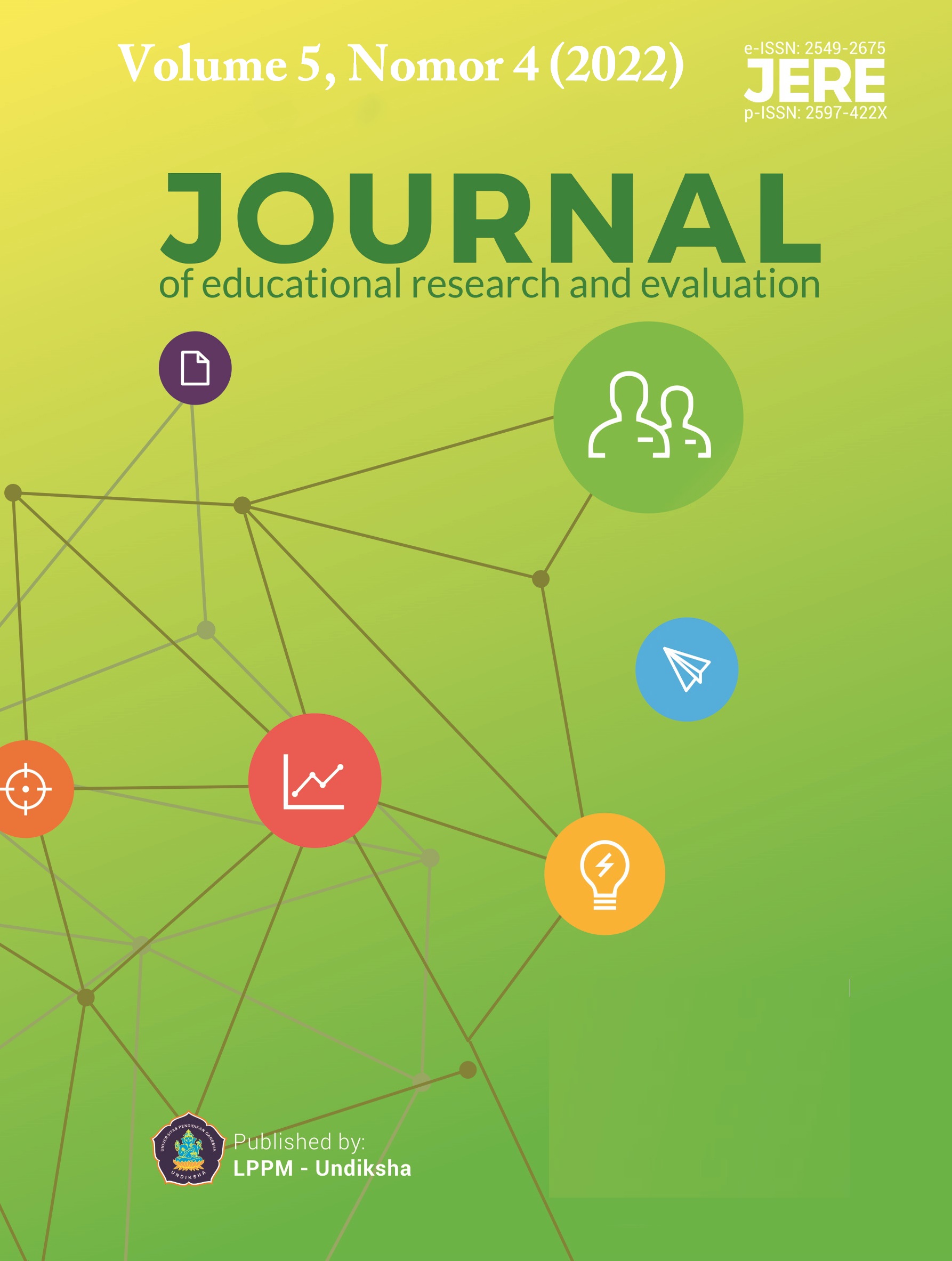Accommodating the Role of Central Axis Lecturers through the Total Institutional Method in Higher Education
DOI:
https://doi.org/10.23887/jere.v5i4.36585Keywords:
Mewadahi Dosen Poros Tengah Dengan Metode Institusi TotalAbstract
The tendency of total institutions is marked through starting from the stages and processes of formation to the birth of the BP3K, which these stages and processes include Compertmentalization The research method used is descriptive method. This study aims to explore the problem to produce a holistic description of the problem. From the research results that they are termed the middle axis lecturer. then they are grouped at once combined into a container. A container that is in accordance with their characteristics and character is a manifestation with a tendency towards total institutions. the manifestation of the tendency of the total institution to be named BP3K, namely the Field of Curriculum Development and Supervision, Resocialization, Isolation, very binding rules, tight control, the role of centralized regulator / coach. BP3K activities in the form of studies and training as well as regeneration of member resources in the field of functional competencies in the realm of Tri Dharma Perguruan Tinggi. The total institutional element that contributes the most to the benefits and impacts of BP3K when compared to other elements is the element of isolation and the strength of the supervisor. the implication of the research results, that through BP3K is to make the College as the organizer of basic character training for lecturers of universities, information and appreciation for two tutors from BP3K as tutorial implementers Basic Characteristics BP3K is also used as an accreditation consultant as well as a training center for various achievements and expertise for the College.
References
Agus, A. A., & Asiah, N. (2021). Implementasi Kebijakan Merdeka Belajar–Kampus Merdeka (Studi pada Fakultas Ilmu Sosial dan Hukum Universitas Negeri Makassar). Jurnal Kreatif Online, 9(4), 32–43. https://jurnal.fkip.untad.ac.id/index.php/jko/article/view/1237.
Akilah, F. (2018). Peran Manajemen Sumber Daya Manusia Dalam Lembaga Pendidikan. Adaara: Jurnal Manajemen Pendidikan Islam, 6(1), 518–534. https://www.jurnal.iain-bone.ac.id/index.php/adara/article/download/282/202.
Arifin, S., & Muslim, M. O. H. (2020). Tantangan Implementasi Kebijakan “Merdeka Belajar, Kampus Merdeka” pada Perguruan Tinggi Islam Swasta di Indonesia. Jurnal Pendidikan Islam Al-Ilmi, 3(1). https://core.ac.uk/download/pdf/328159881.pdf.
Arwildayanto. (2013). Manajemen Sumber Daya Manusia Perguruan Tinggi Pendekatan Budaya Kerja Dosen Professional. CV. Alfabeta.
As’ari, A. R., Kurniati, D., Abdullah, A. H., Muksar, M., & Sudirman, S. (2016). Impact of infusing truth-seeking and open-minded behaviors on mathematical problem-solving. Journal of Social Issues, 72(3). https://doi.org/10.1111/josi.12185.
Bogdan, R., & Biklen, S. K. (1982). Qualitative Research for Education: An introduction to theory and methods (Third Edit). Allyn and Bacon.
Karim, B. A. (2020). Pendidikan Perguruan Tinggi Era 4.0 Dalam Pandemi Covid-19 (Refleksi Sosiologis). Education and Learning Journal, 1(2), 102–112. https://jurnal.fai.umi.ac.id/index.php/eljour/article/view/54.
Mubarak, M. Z., Zulkifli, Z., & Halimatussa’diyah, I. (2018). Kebijakan Deradikalisasi Di Perguruan Tinggi: Studi Tentang Efektifitas Kebijakan Perguruan Tinggi Dalam Mencegah Perkembangan Paham Keagamaan Radikal Di Kalangan Mahasiswa (Studi Kasus UI, UGM DAN UIN Maulana Malik Ibrahim Malang). Istiqro, 16(1), 1–28. http://istiqro.kemenag.go.id/index.php/istiqro/article/view/93.
Mularsih, H., & Aritonang, L. (2017). Profil kualitas layanan jasa pendidikan tinggi perguruan tinggi swasta di Jakarta. Jurnal Muara Ilmu Ekonomi Dan Bisnis, 1(2), 57–67. https://doi.org/10.24912/jmieb.v1i2.896.
Nasution, A. G. J. (2020). Diskursus Merdeka Belajar Perspektif Pendidikan Humanisme. Al-Arabiyah: Jurnal Pendidikan Bahasa Dan Sastra …, 6(1).
Nofia, N. N. (2020). Analisis Tantangan Implementasi Kebijakan “Merdeka Belajar Kampus Merdeka” Pada Perguruan Tinggi Islam Negeri Di Indonesia. PRODU: Prokurasi Edukasi Jurnal Manajemen Pendidikan Islam, 1(2). https://ejournal.uinib.ac.id/jurnal/index.php/produ/article/view/3328.
Saiti, A. (2015). Conflicts in schools, conflict management styles and the role of the school leader: A study of Greek primary school educators. Educational Management Administration and Leadership, 43(4), 582–609. https://doi.org/10.1177/1741143214523007.
Serpa, S. (2018). On the concept of Total Institution. International Journal of Social Science Studies, 6(9), 31. https://doi.org/10.11114/ijsss.v6i9.3467.
Siregar, N., Sahirah, R., & Harahap, A. A. (2020). Konsep Kampus Merdeka Belajar Di Era. Fitrah:Journal of Islamic Education, 1(1), 141–157. https://doi.org/10.53802/fitrah.v1i1.13.
Spencer, M. S., Kieffer, E. C., Sinco, B., Piatt, G., Palmisano, G., Hawkins, J., Lebron, A., Espitia, N., Tang, T., Funnell, M., & Heisler, M. (2018). Outcomes at 18 months from a community health worker and peer leader diabetes self-management program for Latino adults. Diabetes Care, 41(7), 1414–1422. https://doi.org/10.2337/dc17-0978.
Sugiyono. (2014). Metode Penelitian Pendidikan Pendekatan Kuantitatif, Kualitatif, dan R&D. Alfabeta.
Syakur, A., Susilo, T. A. B., Wike, W., & Ahmadi, R. (2020). Sustainability of Communication, Organizational Culture, Cooperation, Trust and Leadership Style for Lecturer Commitments in Higher Education. Budapest International Research and Critics Institute (BIRCI-Journal): Humanities and Social Sciences, 3(2), 1325–1335. https://doi.org/10.33258/birci.v3i2.980.
Widiyono, A., Irfana, S., Guru, P., Dasar, S., Islam, U., Ulama, N., & Belajar, M. (2021). Implementasi Merdeka Belajar melalui Kampus Mengajar Perintis di Sekolah Dasar. Metodik Didaktik : Jurnal Pendidikan Ke-SD-An, 16(2), 102–107. https://doi.org/10.17509/md.v16i2.30125.
Yamin, M. (2018). Kebijakan Literasi Untuk Meningkatkan Produktivitas Publikasi di Perguruan Tinggi. JAS-PT (Jurnal Analisis Sistem Pendidikan Tinggi Indonesia), 2(1), 19–26. https://doi.org/10.36339/jaspt.v2i1.120.
Yusuf, M., & Arfiansyah, W. (2021). Konsep “Merdeka Belajar” dalam Pandangan Filsafat Konstruktivisme. AL-MURABBI: Jurnal Studi Kependidikan Dan Keislaman, 7(2), 120–133. http://ejournal.kopertais4.or.id/mataraman/index.php/murabbi/article/view/3996.
Downloads
Published
How to Cite
Issue
Section
License
Authors who publish with the Journal of Evaluation and Research in Education (JERE) agree to the following terms:
- Authors retain copyright and grant the journal the right of first publication with the work simultaneously licensed under a Creative Commons Attribution License (CC BY-SA 4.0) that allows others to share the work with an acknowledgment of the work's authorship and initial publication in this journal.
- Authors are able to enter into separate, additional contractual arrangements for the non-exclusive distribution of the journal's published version of the work (e.g., post it to an institutional repository or publish it in a book), with an acknowledgment of its initial publication in this journal.
- Authors are permitted and encouraged to post their work online (e.g., in institutional repositories or on their website) prior to and during the submission process, as it can lead to productive exchanges, as well as earlier and greater citation of published work. (See The Effect of Open Access)











